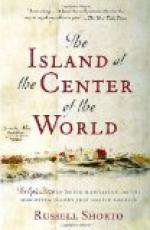The colonists were becoming more and more dissatisfied, not only in New York, but in all of the thirteen English colonies in America. For they strongly objected to the way in which money was being taken from them in the form of taxes. The English had spent much money in the wars which led up to the conquest of Canada, and thought that it should be returned to them. So they taxed the colonists in every possible way. Protest was made against these taxes, but in vain. Matters became worse and worse. After two years, when it had come to be the year 1765, the British Parliament passed what was called the Stamp Act. This compelled the people to buy stamps and put them on every sort of legal paper. No one could be married, no newspaper could be printed, nothing could be bought, nothing could be sold, no business of any sort could be carried on without these stamps. No one could evade the use of them, and in this way all would have to contribute directly to the King.
More than any other form of tax, more than anything the British Government had done, the people opposed this Stamp Act. The colonists had no one to represent them in the British Parliament, no one to present their side, no one to plead for them and tell what a drain this tax was, so they declared that they would not use a single stamp, unless they were allowed to have someone to represent them; and they set up the cry, “No Taxation Without Representation.”
Very soon a company of men called the Sons of Liberty began to be heard of throughout all the thirteen colonies. They were foremost in opposing the Stamp Act. In many towns they held meetings, and it was not long before the people were aroused from one end of the country to the other.
Not many months had passed before men were sent from each of the colonies and met in the City Hall at New York. This meeting was called a Colonial Congress. For three weeks these men conferred, and during that time decided that in good truth the Stamp Act was unjust, and that everything in their power should be done to prevent it.
[Illustration: Coffee-House opposite Bowling Green, Head-Quarters of the Sons of Liberty.]
In this same year the house which Stephen De Lancey had built close by Trinity Church, and which James De Lancey had lived in until his death, had become a hotel. It was called Burns’s Coffee-House. It was a solid structure, with high beams, great fireplaces, and wide halls. If you go now to look for the spot where it stood, you will find a crowded business section; but in those days there were open spaces all about, and a handsome lawn swept away to the river. One October night the merchants of the city gathered in this coffee-house, and here, late at night, they signed a paper which bound them one and all to buy no goods from England so long as the English King should compel them to use the stamps. By this agreement people could, of course, only wear clothing that was made in the colonies, and even the wealthy refused to buy silk and broadcloth that were sent from England. Tea and coffee, being imports, were not drunk, and in their place were used preparations made from fragrant wild herbs of the American soil.




